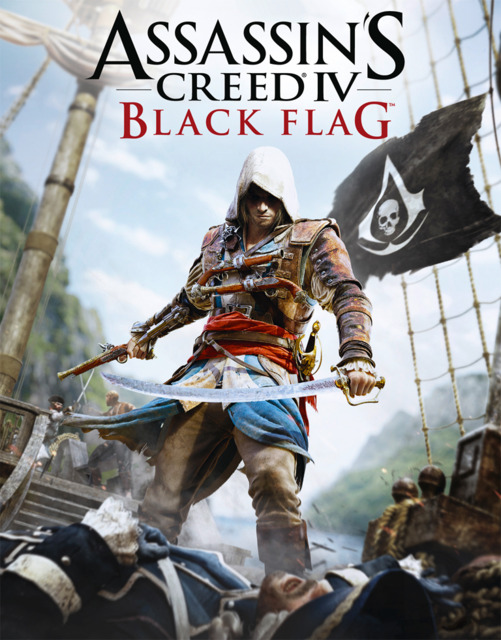Skull and Crossbones
The annual release model is an understandably maligned approach to sculpting game franchises, but it’s odd that Assassin’s Creed in particular became one of those big AAA games we expect to see a new edition of every year. It makes sense for Ubisoft of course, Assassin’s Creed is possibly the most beloved of all their game series, but think about this game in relation to something like Call of Duty, the other big annual action title. Many people don’t even buy CoD for its single-player, they just play the multiplayer which is there for as much or as little time as they want to commit to it, and then they can just put it aside and wait for next year’s entry. Even if they do play through the main campaign it’s linearly structured and a short to medium length. Assassin’s Creed however is built with a lengthy story mode as its main attraction and invites you off on journeys to participate in an insane quantity of collectible hunts, side missions, and now even multiplayer face-offs. The idea that Ubisoft might want or expect us to come back every single year and dance that same dance, soaking in tens of hours of content, is a bit overwhelming, but Assassin’s Creed IV: Black Flag stands out for me as a welcome oasis of originality and delight in a desert of games which has increasingly asked you to dedicate huge chunks of your time to games of mixed quality.
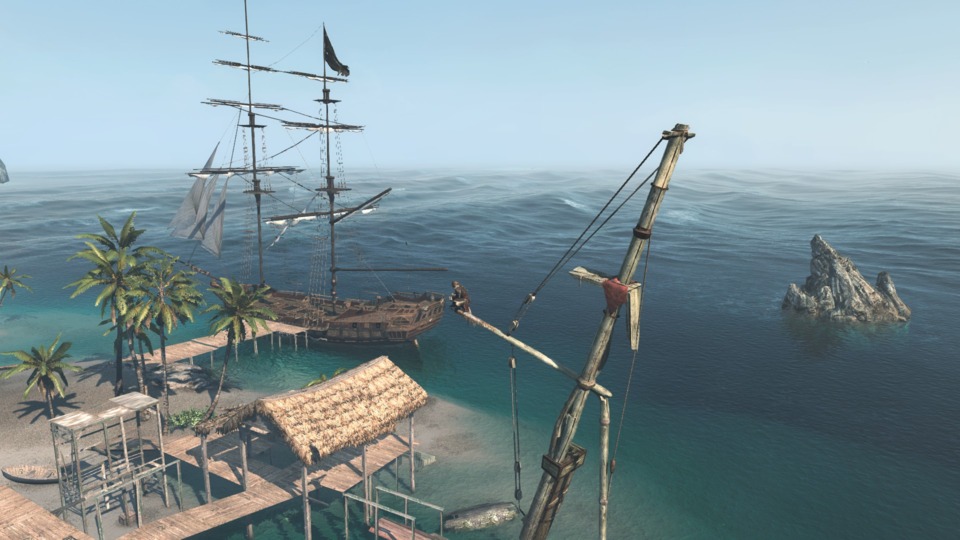
You see, Assassin’s Creed is a game built mostly around environmental traversal, urban platforming, and combat within those contexts, but Black Flag finds itself in the midst of the notorious piracy of the late 17th century-early 18th century Caribbean. Cast out to sea where it can only partly fall back on the cityscape action and nature-based platforming of its predecessors, the series is forced to build greatly on some of the most original concepts of the recent games and invent entirely new mechanics to fill its shining, azure oceans. As in previous games AC IV encases its alternate history fiction within a larger meta-narrative, although never has the series committed to it quite so confidently as it does here. You play a fresh-faced employee of “Abstergo Entertainment”, who are actually the insidious Templars of previous games searching the ancestral lineage of the all-important Desmond Miles under the guise that they’re developing a series of video games that basically are the Assassin’s Creed series. The memories you search through are that of Edward Kenway, a foolhardy man who dreamt of finding freedom and countless riches as a sailor, but became caught up in a tussle between the ancient orders of the Assassins and the Templars over The Observatory, a theoretical device which lets its user see the actions and location of any person in the world.
One unique thing to note about Black Flag upfront is how sharply it divides its gameplay between land and sea. Most on-land locations are instanced sections of seafront town or jungle, although the map also has plenty of small deserted islands dotted about for good measure. What you experience in these locations is more or less what you know from Assassin’s Creed, and its a testament to how knowingly crafted the game is that the large majority of this fare still holds. Thoughtfully designed level layouts combine with strong pacing and the series’ intuitive stealth and combat mechanics to make you feel like a shadowy force to be reckoned with. While Black Flag’s predecessor, Assassin’s Creed III, was generally received with disappointment, it is clear here how important some of its contributions are to the formula. Being able to conceal yourself from enemies in the world’s abundant foliage lets you move between hiding spots more fluidly than in the older games and while having secondary objectives might at first seem like another result of Ubisoft’s occasional proclivity for kitchen sink design, it often now makes it feel like discreetness and mastery of your tools is properly rewarded. It’s also worth noting just how good it still feels to assassinate someone in these games. It’s a great example of design, sound, and animation all flowing aptly and smoothly together to deliver an iconic and satisfying moment, and knock outs and sword kills come from a similar place. The fun to be had here does have its limits however.
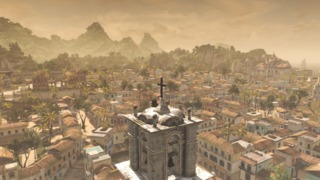
This Assassin’s Creed game, perhaps more than any of the others, feels like it takes a while to get going, and that’s largely because while tightly refined by this point, the standard gameplay is something we all know front to back by now. A small amount of the shine is also wiped away by the mechanical melting pot that Ubisoft are indulging their AAA games as a whole in. This is definitely not the only recent Ubisoft release where, for example, you have to climb to the top of towers to uncover areas of the map, or kill and skin animals to upgrade your armour and ammo pouches. There is fortunately the option to buy the materials you can otherwise only get from harvesting animals to upgrade your equipment, although when you can just economically brute force your way through the system, it does start to suggest that the development team knew they were making a set of challenges that a significant amount of their audience wouldn’t be interested in. While more tolerable than before, the missions in which you’re just meant to stalk characters until they reach their destination do also start to grate after a while. No one of these problems is huge, and collectively they’re not big enough to eclipse the positives of the gameplay, but they’re just enough together to be difficult to ignore.
What really makes the game feel as new and varied as it does is the sailing and sea combat. The fast-travel system is still there to get you to places you’ve already been, but for many missions and to reach new locations it’s necessary to sail your grand ship, the Jackdaw, across the welcoming surf of the Caribbean. The sailing continues the series’ tradition of providing an engaging experience by making even the basic mechanics you use to get from A to B exciting to interact with, and is an essential part of perhaps the thing that the game gets most right: It’s not just an Assassin’s Creed title with a couple of Jolly Rogers hanging off of it, it commits in a more base way to feeling like a game about piracy. You see it in on the large scale with how much of the game you spend behind a helm, sailing towards adventure, you see it in the smaller details like the spray washing over the deck of your ship, and you see it somewhere in between with challenges and opportunities like being able to navigate your vessel through treacherous storms. A wonderful little addition is having sea shanties be collectibles which you can obtain while on land and which your crew will then sing on your voyages. Then there’s the ship-based combat which is not just enjoyable for what it is in itself, but also for the place it takes in the larger picture.
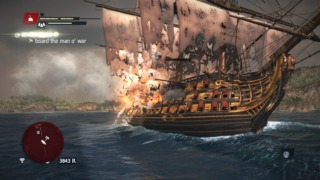
When simply roaming the open-world in Assassin’s Creed, combat encounters are rarely events you feel motivated to seek out yourself. They’re usually the consequence of accidentally running into a group of angry guards instead of being something you’re eager to initiate because they convey any kind of reward, but this is not the case with battle aboard the Jackdaw. The game is generally smart about resources. While many other AAA games have you overflowing with money by a certain point so you don’t feel like you are ever obligated to perform side activites, Black Flag makes sure that if you want all those shiny new items you earn your keep, and that’s never truer than when out on the oceans. The increasing difficulty of the missions means that upgrading your ship over the course of the game is a necessity, however it can only be upgraded using the wood, iron, and cloth you can raid from other ships. It gives you an incentive to not just go out and storm vessels, but to equally as importantly do it under your own volition, which is a big part of what makes you feel like a pirate. Similarly, there’s also a mini-game in which you can have your ships battle Navy forces and run cargo across the Atlantic which adds to this sense that you’re a great pirate captain, although playing with this mini-game for too long becomes tiresome as a less than perfect UI leaves you with far more scrolling through menus than is necessary.
For the proper sea combat, the design quality is much higher. The air becomes heated and urgent because there are a lot of little moves you have to make with your ship which add up to something bigger. A dumber game might have just made the goal to line up your ship against your opponent’s and make broadside attacks over and over, but ships are bulky and don’t have a huge deal of maneuverability, meaning that those kinds of battles often have large gulfs of time where you’re doing nothing more interesting than turning around. The combat here isn’t just about positioning and using your main cannons, you can also rain fire down on your enemies with your mortar, adjust your speed, drop fire barrels behind you, ram other ships, fire on their weak points with your swivel cannons, launch chain shots from the front of your ship, and more, and this all keeps things moving. The battles also build to not just the possible sinking of enemy ships, but if you want to really plunder them, jumping aboard and killing the enemy crew to take them for yourself. It means that at the conclusion of fights you don’t just hit a “The ship is beat now” screen, you get to take to the burning deck of the enemy schooners and brigs, and more closely play a part in forcing their surrender. The only real times the game doesn’t do right by this combat are during some occasional wrestling with the camera while fighting aboard ships and in the existence of the “restricted areas” out at sea. They’re most likely there to make it so that you can run into more battles in these dangerous expanses of the Caribbean, but the idea of navigating your way around ships with vision cones is silly. It’s unintuitive to try to precision captain the enormous Jackdaw through gaps in the line of sight of enemies, and this “ship stealth” element runs contrary to the sense of freedom the game is otherwise about. And that sense of freedom is all-important to the game.
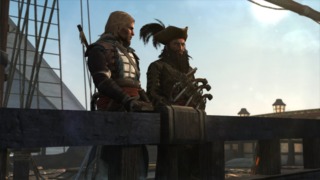
One of the strange things about Assassin’s Creed is that the Assassins as a group are concerned with order, discipline, and focus in their operations, meanwhile the gameplay is concerned with being forgiving and spontaneous. You don’t need monk-like discipline because even when you do fail to slip effortlessly by oblivious guards, you still have an out. You’re actively discouraged from being single-minded and focused, and instead nudged into deviating from your main responsibilities whenever you feel like it to entertain collectibles and side-missions. Kenway however, has no delusions of grandeur here. He’s not concerned with the enshrined values of ancient orders, he just wants to be a man unbound by rules and free to earn his gold, and that gels a lot better with a mechanical framework which lets you scale entire buildings and trip over yourself in fights but keep on going. Not to mention the way these sentiments line up with questing across the vast, open ocean.
In general the roguish nature of Kenway makes him fun to play and it’s a bit like a childhood fantasy come to life to be able to pillage and plunder with the likes of Blackbeard and Mary Read. The game manages to bend the history just enough to give each of the historical figures an animated and magnetic personality while retaining various key events in their lives and a certain truth to them. It wouldn’t be an Assassin’s Creed story if it didn’t come apart at the seams somewhere along the line though. When I first saw them introducing the Ubisoft/Abstergo concept in the plot I was pleasantly surprised not only with how bold and funny this choice was, but also with how getting the more ridiculous elements of the story out in the open near the beginning should have helped avoid the almost deliberate whiplash the series likes to create by playing as a piece of alternate historical fiction for 98% of its runtime and then producing some borderline nonsensical sci-fi in its closing minutes for the sake of it. As it turns out however, there’s no underlying premise for a story so farfetched that Ubisoft can’t manage to make it look like the epitome of logic by the end of their game. There’s something vaguely interesting in how far they go with the twist at the end of this one, but it’s basically just the series utilising one of the most played-out sci-fi tropes there is with no meaningfully unique execution to do what it wants to do. Once again, one of the problems is that the series doesn’t lay enough groundwork leading up to its closing to make you care all that much about the consequences of anything that happens during it.

That’s not to say they don’t try to build some sort of narrative path up to the end. There are, for example, various points in the single-player mode where your mission becomes to get up from your desk in the Abstergo building and wander the corporate complex on various tasks, but while it’s a very pretty office and the hacking mini-games you’re given play enjoyably enough, trundling about the place like an expedient roomba doesn’t compare to the enlivened sailing and platforming of play inside the Animus. It’s just plain bizarre that they’d couch this adventure of leaping from rooftops and blowing cannonball-shaped holes through enemy ranks in a setting which has you hanging around water coolers, listening to the banal speeches of your co-workers. What’s more, the protagonist is an emotionless mute, you can see the bad guys coming a mile off, and the characters who play instrumental parts in the story are vague wisps of people, they don’t really matter. I’ve seen the meta-story here praised for its tongue-in-cheek hilarity, but it actually feels like the game takes what starts as a good high concept joke and turns it into a meaningless super-plot purely because it’s something that could be done, not because it serves any firm purpose. Even concerning the in-Animus content, the game doesn’t really know how to end, to the point where a huge chunk of important exposition is explained out loud by a character over the credits, the events following on from a story thread that felt once relevant but was dropped somewhere around the end of the game’s first act. I mention the faults in the story not because any of them do disastrous damage to the game, but more because they’re interesting and a bit of a testament to how we tend to excuse shoddy writing in games as a medium. If you want to see the truly disastrous though, it’s here, and it lives in the multiplayer.
When functional at a technical level, the multiplayer mode exhibits the same properties as it has ever since its introduction in Assassin’s Creed: Brotherhood. You end up playing for those delicious moments where you feel like you’re winning a truly psychological struggle against your opponents. It’s the thrill of being able to trick your enemies into thinking you’re something you’re not, right up until the second when what they thought was a computer-controlled crowd member slits their throat clean open, and I’m still not bored of that. It’s a take on multiplayer that you can’t get anywhere else and can be so intellectually empowering. As ever though, it’s undermined by the fact that your targets or pursuers may abandon their stealth mindset to sprint about the map, meaning you have to run about the level yourself to catch/avoid them, and then the other people involved with you probably have to do the same, and you sometimes see this domino effect which causes the stealth dynamic to drop out from the bottom. Then there are various abilities which can be utilised in this mode which seem to break the spirit of it. When your pursuers can just click a button to see who’s a real player and who’s not, and when certain abilities can only be countered on the off-chance that you happen to have certain other ones equipped, it feels less than fair. All of this I’ve tolerated in the past. It’s frustrating and it ruins matches, but often I pushed through because of how good the multiplayer was when it was good. This time however, I encountered technical issues that pushed my patience beyond the realm of the reasonable.
It wasn’t the faults with the menus, which went so far that on two occasions I had to reset the game to make them functional. It wasn’t even the three times the multiplayer crashed to desktop with no explanation why. Instead it was the game’s inability to find, connect to, and stay connected to multiplayer matches. Reports of connection issues similar to the ones I had aren’t exactly rampant, but they’re out there, and there has been a bit of a history of server issues on the Assassin’s Creed PC ports. Despite using a machine and broadband connection that is fine for every other multiplayer title I’ve played, checking the game was reporting a good connection speed and an open NAT, allowing the multiplayer executable and uPlay through my firewall on all ports for TCP and UDP, flushing my DNS cache, rebuilding my hosts file, creating an exception for the program in my anti-virus software, and trying to port forward both uPlay and the game, still I’d sit for twenty or thirty minutes in front of my monitor as the program failed to properly connect to any online matches. Maybe there was something more out there I could have done to get my client speaking to the Ubiservers properly, but the idea that it should take this much tweaking to get a game to operate at a basic level when every other game I’ve had runs online with almost no special alterations is crazy. As far as I am concerned the network connectivity of this product is broken.
When it comes to Assassin Creed IV’s multiplayer your mileage may vary, and what can be a game of invigorating cunning and misdirection can be hamstrung either by the game’s action-adventure leanings or by embarrassingly severe connection issues. The single-player however is one of the best of the series. There’s a slight aftertaste of lazy narrative work and design-by-committee politics to it, but you still want to be that tower-scaling, collectible-hunting, ghost-like assassin, and your adventures on the open waves bring a sense of bracing freedom and domination of your foes in the only way a pirate knows how. This entry into the series stands out as more varied and original than what has come both immediately before and immediately after.
